Painful story of Hazrat Roghaieh
Hazrat Ruqayyah grew up in a family that all its members were the great followers of Imam Hossein. This family was consisted as the greatest role models of science, ethics, knowledge, and devotion like Hazrat Zaynab, Abu l-Faḍl Abbas, Ali ibn Hossein, Ali akbar, and …
Our salutations be upon whom the angels of the heaven wept over him, the one that his family are pure and clean! The leader of our religion! Our praise be upon those wisest of all! Those praiseworthy leaders! Those torn collars, dry lips, helpless spirits that were taken out of their bodies! Those naked corpses, those emaciated bodies, those flowing bloods, those cut organs of bodies! Those heads on the spears! Those women taken out of the tents! Our praise be upon the proof of the God of the worlds!
She grew up in a family that its father, mother, and all the children possessed the highest degree of faith and ethics. Furthermore, she enjoyed the effects of the Prophet Muhammad that were still dominating the city and its people.
1. Ruqayyah in Karbala
Hearings and sayings about Imam Hussein (as)
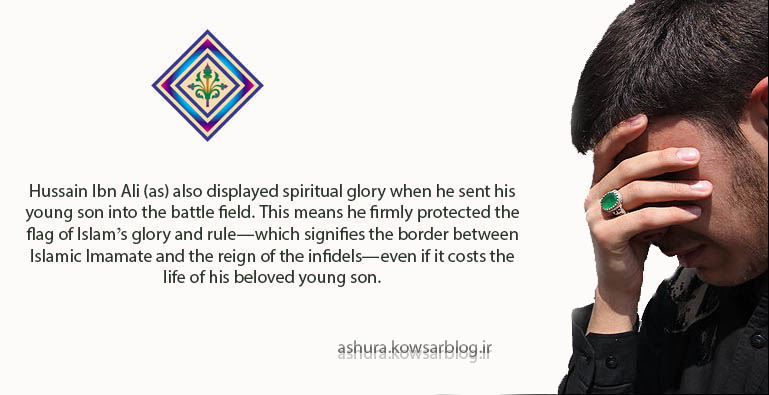
Ahadith, The Traditions
1. The Inferno of Husayni Love
قال النبيٌُّ (ص):
إن لقتل الحُسين حرارةٌ في قلوب المؤمنين لا تبرد أبداً
The Holy Prophet (S) said: Surely, there exists in the hearts of the Mu’mineen, with respect to the martyrdom of Husayn (A.S.), a heat that never subsides.
Mustadrak al‑Wasail vol 10 pg. 318
2. A’ashura ‑ A Day of Grief
Imam Ridha’ (A.S.) said:
قال الرضا (ع):
مَن كان يوم عاشوراء يوم مُصيبته وحُزنه وبُكائه يجعل الله عزَّ وجل يوم القيامة يوم فرحه وسروره
The one for whom the day of A’ashura is a day of tragedy, grief and weeping, Allah The Mighty, The Glorious, shall make the Day of Judgment, a day of joy and happiness for him.
Bihar al‑Anwar, vol. 44, pg. 284
3. Muharram ,The Month of Mourning
Imam Ridha’ (A.S.) said:
critical Juncture In The Life Of Mankind

critical Juncture In The Life Of Mankind
Days Of Separation
The days of separation are distinct occasions in history that classify people into two or more groups. The place of these occasions in history is similar to that of crossroads which people come across during their journeys. Roads and highways bring together the travelers till they reach the crossroads where they split into two, three or more groups. In the same way, days of difficulty separate people who were together during days of ease and comfort.
The holy Qur’an named the day of Badr the Day of Separation1 because the people who were hitherto living together in Mecca during peace time were divided into two belligerent parties on that day.
It is not always possible for a person to live a life of civility and pleasant social intercourse with all the people, for God Most High has assigned, in the course of history and the life of mankind, days on which they have to make a resolution concerning what they say or do. They have to take a decision on war or peace; whether to continue their relationships or sever them; whether they will turn towards God or away from Him. These days are the days of separation.
Ashura Is Among The Days Of Separation
The day of Ashura was a day of separation in Islamic history. It divided the people who were living together during peace time into two different groups: one group stood with Husayn (as) and fought the Umayyads, while the other supported the Umayyads and fought Husayn (as). On that day, the people had no choice but to select and decide on which side they would fight, and, there was no other option. This is the feature which distinguishes the days of separation: it forces the people to choose the party to which they will give their loyalty and repudiate the other.
walk Arbain
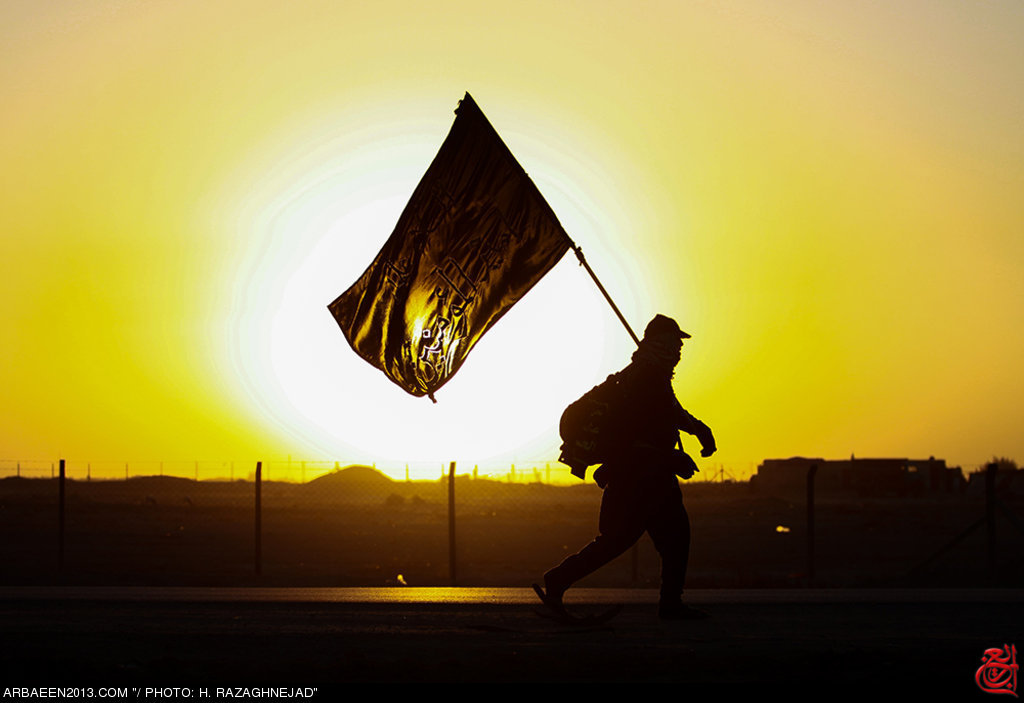
The Concept of the Union from the Standpoint of Arbaeen
.
The Concept of the Union from the Standpoint of Arbaeen[1]
Fighting against Arrogance and Opposition to the Cruelty as an Intrinsic Nature of Human Being
Opposition between justice and cruelty has been existed from the first day of the Creation until forever. Bringing justice and eliminating cruelty have been institutionalized in human nature so that such attitude known as “Fighting against Arrogance” on global scale.
Islamic Messianism is a Common Doctrine among all Religions
Since survivalism and anti-arrogant trend are common among all people, both can pave the way for creating a harmonious movement resulting in bliss for people; in fact, Islamic Messianism and anti-arrogant trend are the two key features of Arbaeen which form a union among Muslims.
The process of people’s walking tour to Karbala is considered a symbol of Islamic Messianism and anti-arrogant trend so that this movement is regarded as a practice of intrinsic fight against global arrogance that are basic principles of the Islamic Revolution of Iran. Indeed, the mentioned movement can keep Muslims closer together resulting in a union.
Eliminating Israel
Reward of the Martyred Companions
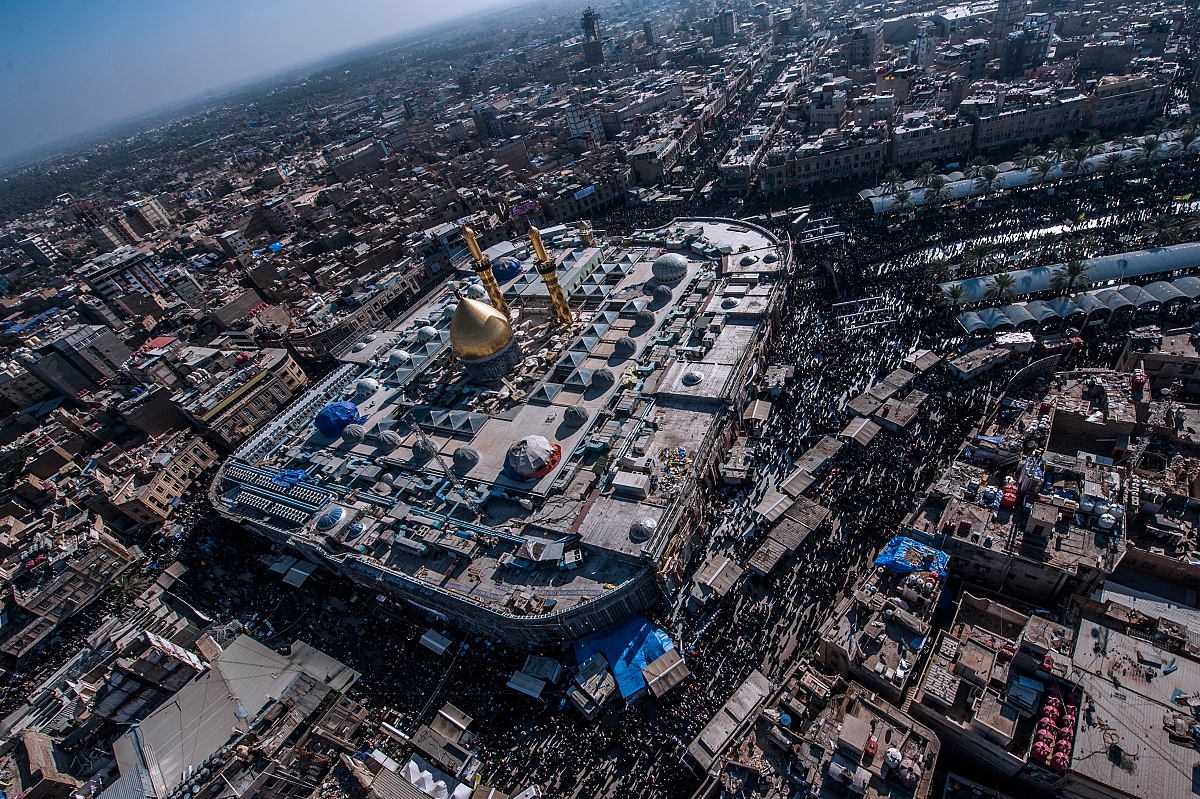
Reward of the Martyred Companions
قال الرضا (ع):
إن سرَّك أن يكون لك من الثواب مِثلُ ما لمَن استُشهد مع الحُسين فقُل متى ما ذكرته يا ليتني كُنت معهم فأفوز فوزاً عظيما
Imam Ridha’ (A.S.) said (to one of his companions): If you desire that for you be the reward equivalent to that of those martyred along with Husayn (A.S.), then whenever you remember him say: ‘ Oh! Would that I had been with them! A great achievement would I have achieved’.
Wasaail al‑Shia’h, vol. 14, pg. 501.
Laughing Eyes
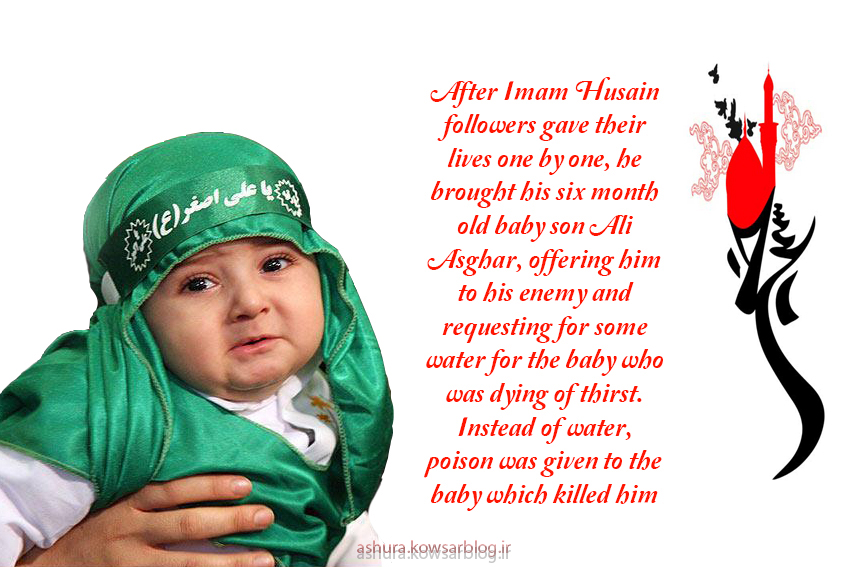
The Holy Prophet (S) said:
قال النبيُّ (ص):
يا فاطمة كلُّ عينٍ باكية يوم القيامة إلاَّ عينٌ بكَت على مُصاب الحُسين (ع) فإنها ضاحِكة مُستبشرة بنعيم الجنة
O’ Fatimah! Every eye shall be weeping on the Day of Judgment except the eye which has shed tears over the tragedy of Husayn (A.S.) for surely, that eye shall be laughing and shall be given the glad tidings of the bounties and comforts of Paradise.
Bihar al‑Anwar, vol. 44 pg. 193.
Muharram ,The Month of Mourning
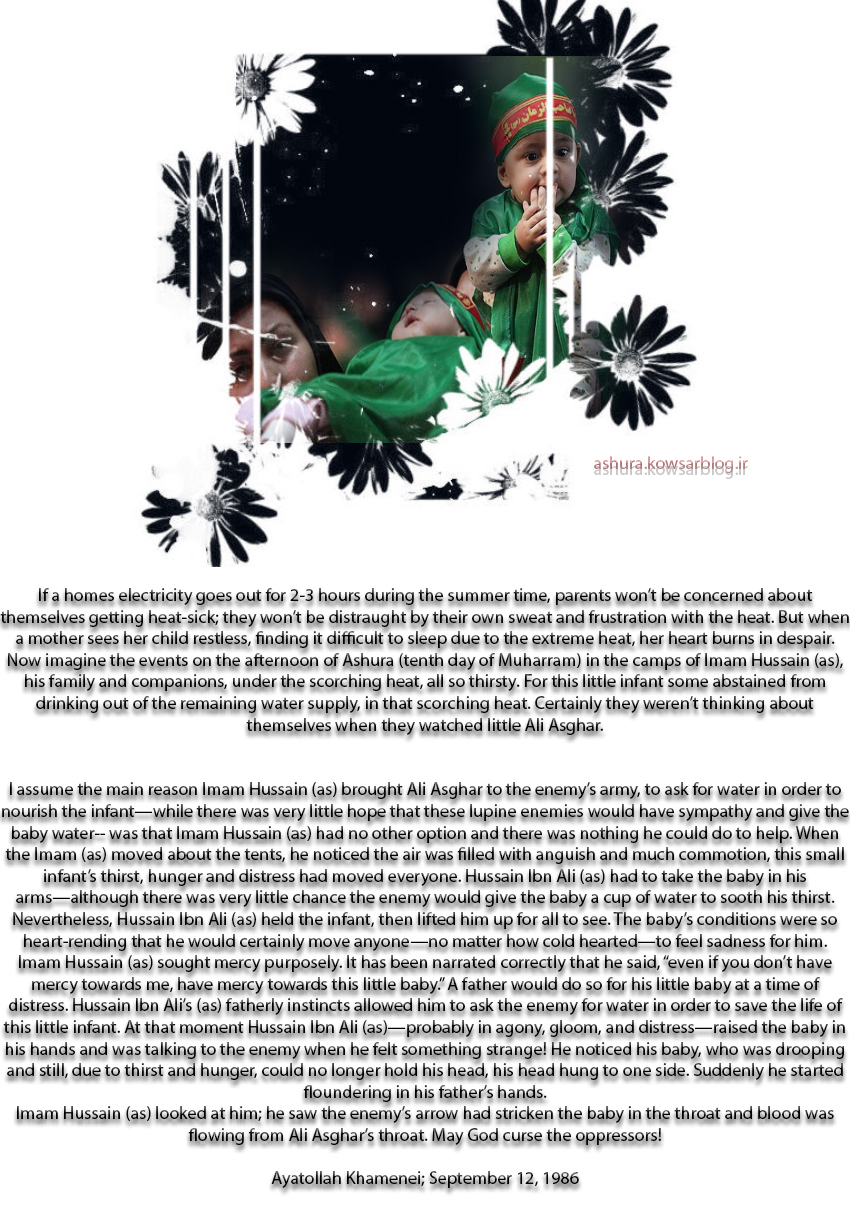
Muharram ,The Month of Mourning
Imam Ridha’ (A.S.) said:
قال الرضا (ع):
كان أبي (ع) إذا دخل شهر المُحرَّم لا يُرى ضاحِكاً وكانت الكابة تغلب عليه حتَّى تمضي عشرة أيَّام فإذا كان يوم العاشر كان ذلك يوم مصيبَته وحُزنه وبُكائه
With the advent of the month of Muharram, my father Imam Kadhim (A.S.) would never be seen laughing; gloom and sadness would overcome him for (the first) ten days of the month; and when the tenth day of the month would dawn, it would be a day of tragedy, grief and weeping for him.
